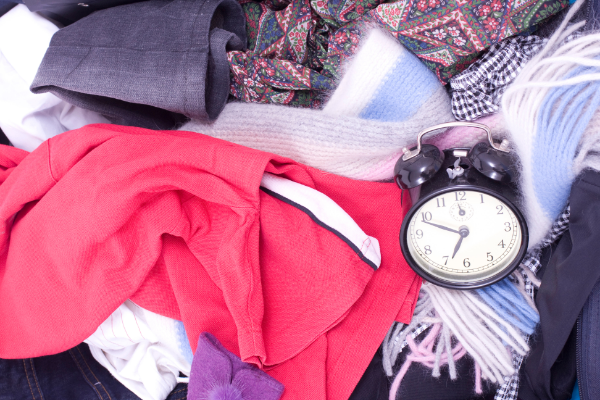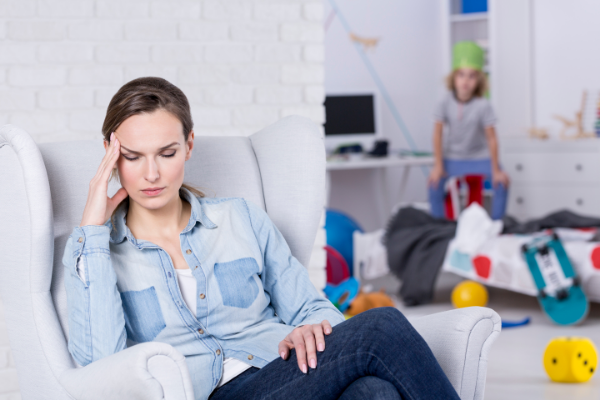Clutter! Most of us have a little of it here or there. In fact, many of us have more than just a little. A few years back the National Association for Professional Organizers conducted a survey in which a third of the participants responded that they were overwhelmed by their clutter and didn’t know what to do about it. In contrast only 10% said they were clutter free. How is all this disarray impacting us?

Time
People often think of clutter as siphoning our energy, but it also drains us of our time. How? People in cluttered homes spend excess time, virtually everyday, looking for misplaced items, such as keys, money, shoes, tools, etc. Even when we are looking right at the misplaced item, it becomes difficult to see when encompassed by clutter. And the additional time it takes to hunt through the mess tallies up.
Money
When we don’t have financial papers arranged, bills can get lost, causing us to accumulate late fees. Replacing lost items and purchasing duplicates of those we didn’t realize we already had can also carry an expenditure that adds up rapidly.

Stress
The most evident toll that clutter takes is added stress on a person’s life. Here are some examples of stress clutter can cause:
- Having guests over becomes an embarrassment as does an event that takes all day to prepare for.
- Each room carries visual reminders of the work that needs to be done in the way of cleaning.
- Using your home for activities like yoga or playing board games, for example, becomes difficult or impossible without taking significant time to clean the space beforehand.
- A cluttered home, rather than a refuge from stress, is a big stresser in itself and
A Realistic Amount of Clutter
For most of us, especially for parents of small children, it’s not realistic to sustain a home in flawless order every moment of each day. While it’s stimulating to peruse through catalogs that show immaculate rooms or stroll through a pristine uncluttered model home, holding oneself to such lofty norms of neatness may not only be unrealistic but it can result in added stress. For example, if you find yourself scolding or begrudging other family members for the minor messes that they make to the point that it aggravates family cohesiveness, you may need to adjust your standards.
How Much Is Too Much?
Knowing the toll clutter takes, how much clutter is too much? While we know that stacks of clutter can cause stress and an impeccable home may be unrealistic for some people, the amount of acceptable clutter may vary from person to person.
- Stress: The first sign that you have too much clutter is the impact it has on your stress levels while at home. It’s useful to remember that you best treasure your home when it’s a haven for you. Can you truly unwind in your home or is it an energy drain?
- Company: It can also be stressful to do a complete cleaning of your home before having any guests over. Do you feel troubled that you can’t have someone drop by without fretting about getting everything in order first?
- Organization: Is your home orderly enough that you can, as a general rule, locate everything you’re looking for without having to search?
How to Get Organized?
Basic steps
There are many books and entire websites devoted to helping you declutter your home, but there are some basic beginning steps that work well, regardless of your current state.
- Go room by room and divide your things into four boxes: things to donate, things to throw away, things to keep, and things to store. If you don’t need it or love it, consider getting rid of it.
- Go through your box of things to keep and find a place for everything. Make it a logical place that’s in the same area where it’ll need to be used. For example, keep keys by the door.
- Finish one room before moving on to the next.
Depending on your clutter this can be done in a day, a week, or over several weeks in 15-20 minute increments. Remember, you are trying to relieve stress, not ratchet it up, so proceed at a pace you feel comfortable with. It does not have to be a sprint.

Organize What’s Left
As you find places for what you’re keeping, be sure you’re storing things in a way that makes sense and looks nice. Kids’ toys can be stored very neatly in tubs, which provide quick cleanup and keep toy clutter out of sight. Getting drawer organizers for your bathrooms and kitchen can keep drawers from overflowing with extra items. Having a filing system for papers makes it easy to put them away and find them when you need them. Putting a little extra into organizing your things now will save you time cleaning up and maintaining order for years to come.
Create Beauty
Once you have your home decluttered and organized, you can add a few touches that can make your home the consummate sanctum for you to de-stress. This can include candles or flower arrangements or art pieces and other decor items that make you feel calm and happy in your space.

Music
I strongly recommend that you have a system in place for playing music. Music is a wonderful stress reliever that can energize or relax (depending on the type you use). Incorporating music into the background can help contribute to a peaceful home environment. It’s a great way to relieve the stress of those you’re with and relieve your own stress without much effort.
Aromatherapy
Because aromatherapy is creating a buzz these days, it’s easy to find products that provide a wonderful soothing scent for a room. And the hype isn’t unwarranted; aromatherapy research shows that there are real stress relief benefits to its use. Aromatherapy can help create a peaceful home that subtly offers passive stress relief, making it a recommended element of a serene home.
Creating a Space for Stress Relief Activities
One of the challenges of maintaining stress relieving habits is that we get busy and let other activities in our lives come first. If we build in a physical space for our stress-soothing practice, we have a reminder, as well as a facilitator, to help maintain the motivation to keep these practices in our lives. It is important to construct a small place for yourself to use while reading, journaling, or for yoga or meditation. It may become your favorite part of the home, the place you know you can go to to become relaxed and rejuvenated.

Create Positive Chi
The eastern practice of feng shui, the ancient art of placement, is gaining popularity all over the world, as people notice their surroundings can influence the way they feel and the energy that they have. Feng-shui holds that the placement and type of objects in our homes can affect our energy or chi. Whether or not you are interested in feng shui, you have probably noticed that cluttered environments can be an energy drain, even if just because there’s so much to look at (and everything you see is a reminder of work to be done).
I do think, though, that factoring in a little feng shui (or a lot) can bring long term benefits. Once you incorporate the stress relieving elements of feng shui, you don’t have to constantly maintain most of the changes, they’re just part of your decor. There are many resources available to help you understand this ancient art and apply it to your 21st century home.
How to Stay Organized
Getting your home more ordered feels great. However, just as it takes exertion to sustain weight loss over time, an uncluttered, clean house takes a little ongoing effort as well. Fortunately, this effort can be lessened with the help of expert guidance. The following are some of the best snippets of advice from the clutter-relieving experts:
- Keep a schedule. This is a winningly organized way to maintain a clean house, especially for those who work best when they have a list of “to-dos” to follow. You know your own life best, and you know when tidying or vacuuming can best fit into your schedule. However, the experts all agree that when you have a schedule, you’re more likely to have a less cluttered home. When there’s no schedule other than “I’ll get to it when I get to it,” people tend not to ever end up getting to it.
- Follow the 30-second rule. This potent rule goes like this: if a job takes around 30 seconds or less to do, do it immediately. This pertains to putting away your shoes, sorting mail, and other small jobs. Anything else you were about to do can wait 30 seconds.
- Watch Your “Hot Spots.” Remember those piles that you just got rid of? Clutter tends to collect in the same places (the front door, the kitchen table, etc.) little by little each day. Focus on the areas where you are inclined to leave clutter at the end of each day, so they don’t turn into big piles again.
- Put Your Things Away. Once you have “a place for everything and everything in its place” you’re ready for this rule: when you take something out, you should simply put it back after you’re finished with it. This is also a great rule to teach your children at a very young age….the younger the better! But it also takes modeling. If the kids see you putting your things away, they are more likely to put their things away. If they see you leaving your stuff out, obviously they’re probably not going to put their own things away.
- Take 15 Minutes. Many cleaning experts recommend that you put on some music and take 15 minutes a few times a day to clean. You can get a lot done in 15 minutes even if it’s only once a day.
A Few More Simple Tips
- Do a light cleaning at the end of every day.
- Do a more thorough cleaning once a week (or hire someone to do it for you if it fits your budget).
- Have people over more often and really enjoy your home.
Live like you really appreciate your newly beautiful haven, and you’ll automatically be more likely to maintain it. Remember, the more clutter there is, the more likely you are to keep it cluttered. Conversely, when the house is neat and tidy and clutter free, you’ll be less likely to just leave things laying out. Use our simple tips to declutter and then keep your home clutter free.






